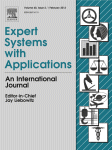Expert Systems with Applications Article Appeared on Ant Colony Optimization for RDF Chain Queries for Decision Support
Alexander Hogenboom, dr. Flavius Frasincar, and prof. dr. Uzay Kaymak, members of ECBI, have published an article in Expert Systems with Applications on a general ant colony optimization for RDF chain queries for decision support. The article apears in volume 40, issue 5 (pages 1555-1563) of the ISI 1st quartile journal.
 Semantic Web technologies can be utilized in expert systems for decision support, allowing a user to explore in the decision making process numerous interconnected sources of data, commonly represented by means of the Resource Description Framework (RDF). In order to disclose the ever-growing amount of widely distributed RDF data to demanding users in real-time environments, fast RDF query engines are of paramount importance. A crucial task of such engines is to optimize the order in which partial results of a query are joined. Several soft computing techniques have already been proposed to address this problem, i.e., two-phase optimization (2PO) and a genetic algorithm (GA). Hogenboom, Frasincar, and Kaymak propose an alternative approach – an ant colony optimization (ACO) algorithm, which may be more suitable for a Semantic Web environment. Experimental results with respect to the optimization of RDF chain queries on a large RDF data source demonstrate that their approach outperforms both 2PO and a GA in terms of execution time and solution quality for queries consisting of up to 15 joins. For larger queries, both ACO and a GA may be preferable over 2PO, subject to a trade-off between execution time and solution quality. The GA yields relatively good solutions in a comparably short time frame, whereas ACO needs more time to converge to high-quality solutions.
Semantic Web technologies can be utilized in expert systems for decision support, allowing a user to explore in the decision making process numerous interconnected sources of data, commonly represented by means of the Resource Description Framework (RDF). In order to disclose the ever-growing amount of widely distributed RDF data to demanding users in real-time environments, fast RDF query engines are of paramount importance. A crucial task of such engines is to optimize the order in which partial results of a query are joined. Several soft computing techniques have already been proposed to address this problem, i.e., two-phase optimization (2PO) and a genetic algorithm (GA). Hogenboom, Frasincar, and Kaymak propose an alternative approach – an ant colony optimization (ACO) algorithm, which may be more suitable for a Semantic Web environment. Experimental results with respect to the optimization of RDF chain queries on a large RDF data source demonstrate that their approach outperforms both 2PO and a GA in terms of execution time and solution quality for queries consisting of up to 15 joins. For larger queries, both ACO and a GA may be preferable over 2PO, subject to a trade-off between execution time and solution quality. The GA yields relatively good solutions in a comparably short time frame, whereas ACO needs more time to converge to high-quality solutions.
More information
Paper

